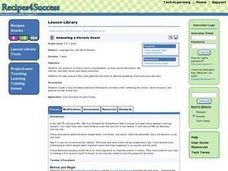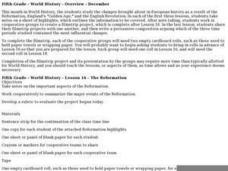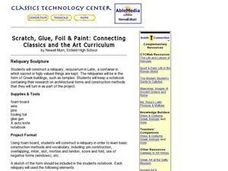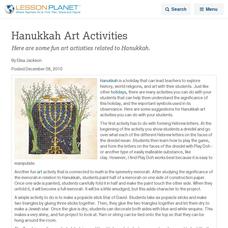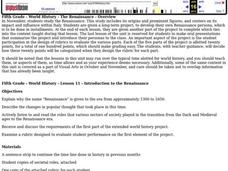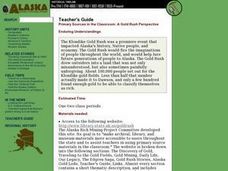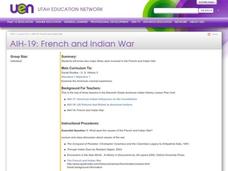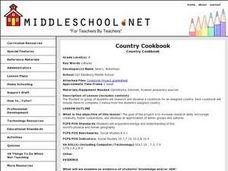Curated OER
Animating a Historic Event
Research a historic event using textbooks, primary source documents, the Internet, and other library and media resources. Young historians will take the research they have gathered and write an attention-grabbing, historically accurate...
Curated OER
Bob Dylan: No Direction Home
Students hold panel discussions on selected topics about the 1960s and their impact on modern-day events. As visual reinforcement, they watch the film about Bob Dylan and research the music of the period as well as his musical...
Curated OER
Leschi: Justice in Our Time
Students examine the lives of the Nisqually people and the resource consumption philosophy. For this Native American philosophy lesson, students use primary sources to understand the resource consumption philosophy and then evaluate...
Curated OER
A Treaty Tail: U.S. - Indian Treaty Councils in the Northwest
Students view a painting as a document to find out about the Indian Treaty Councils. In this artist's perspective lesson, students study the conflicts as shown in various pictures. Students answer questions about what they...
Curated OER
The Mighty Mississippi River
Students acquire in-depth knowledge of the geographic significance of the Mississippi River. They identify and expand their knowledge of the role of the river in the development of cities. Finally, students gain insight into the ways...
Curated OER
The Reformation, Golden Age and English Revolution
Fifth graders create outlines and take notes on lectures that present the Reformation, England's Golden Age and the English Revolution. They use these outlines to create filmstrips and write an essay arguing which of these periods was...
Curated OER
Scratch, Glue, Foil & Paint: Connecting Classics and the Art Curriculum
High schoolers construct a reliquary using foam board, researching basic Greek and Roman architecture and basic construction methods. They record their research and information in an architectural journal.
Curated OER
Giving Human Rights a Human Face
Young scholars produce a creative expression of an article of the Universal Declaration of Human Rights. They may also create posters to serve as reminders for creating a human rights environment or community.
Curated OER
Cloudy With A Chance of Meatballs
Second graders explore weather. In this weather lesson, 2nd graders read Cloudy With A Chance of Meatballs and participate in four supplemental science activities. Students participate in Internet research, create weather maps,...
Curated OER
The Renaissance
Fifth graders examine the rise of the Renaissance and the contributions and roles of various groups such as ancient Greeks, Muslim scholars, the aristocracy, the Catholic Church, and tradesmen. They develop and write a report on a...
Curated OER
Celebrate Hispanic Heritage Month!
Students use information from the U.S. Bureau of the Census to create a bar graph, a picture graph, or a circle graph showing the country of origin of U.S. Hispanics.
Curated OER
Explosive Knowledge
Students examine China's suspected theft of American nuclear secrets, as a springboard for the creation of a research-based, multi-tiered timeline that traces the development, regulation, and use of nuclear weapons from the 1940's to today.
Curated OER
The Great Gatsby: Primary Sources from the Roaring Twenties
Young scholars research the Roaring Twenties. In this 1920's America lesson, students analyze primary sources to develop an understanding of lifestyles and values of the era as they read F. Scott Fitzgerald's The Great Gatsby.
Curated OER
Bringing Peace to the Balkans, Piece by Piece
Students examine how the bond of traditions became the binding force of nationalism for which the Serbian forces now fight at the cost of the lives and livelihoods of ethnic Albanians. explore human rights issues surrounding the conflict...
Curated OER
WHO WE ARE
Students work with Elders or a knowledgeable adult/expert to learn details of their culture which may include the language, dance, songs, art, and stories and create a play or poem which reflects aspects of their culture.
Curated OER
Primary Sources in the Classroom: A Gold Rush Perspective
Learners develop and hone their historical inquiry and analytical abilities. They draw up a list of 20 essential items they would have to bring to survive one year as a Gold Rush stampeder.
Curated OER
French and Indian War
Eleventh graders examine why major tribes were involved in the French and Indian War. They write a short paragraph about the causes and answer an essay question based on text and Internet research, citing sources. They research text...
Curated OER
Country Cookbook
Students, in groups, create menus for five traditional meals from a country of their choice. They create a cookbook that includes all the recipes and describes when the traditional dish would be served.
Curated OER
Travel Through Time with a Family Member
Students interview a family member. In this interviewing lesson, students choose a family member to interview and write about. Students create a PowerPoint about the person including a timeline, photographs, and a narrative about their...
Curated OER
Flight Dreams: Birds Flew First
Students observe how bird flight and machine flight are similar. For this aerodynamics lesson, students observe how birds fly and the shapes of their wings, and investigate how observing birds helped develop the concept of machine...
Curated OER
Peace and Perspective through Poetry: The Dream of Peace in the Middle East
Middle schoolers use poetry to understand conflict in the Middle East. In this poetry instructional activity, students read persona poems and use the poetry and a novel as mentor text to guide their own poem about peace in the...
Curated OER
Land of the Rising Sun
Students survey aspects of traditional and modern Japanese customs and beliefs in the seven lessons of this unit. Both the culture and the geography of the country are studied in this unit.
Curated OER
What Drives Immigration?
Young scholars research the primary causes of emigration and examine the affects of immigration on a country. They conduct research either individually or as a group and prepare a written report or dramatic presentation of their findings.
